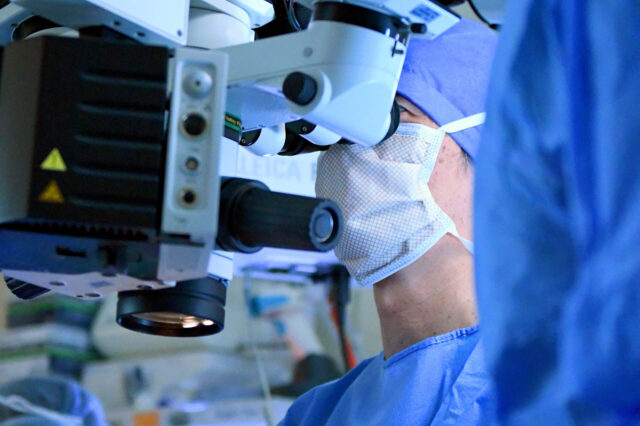- Investigator
- Sandeep Grover
- Status
- Accepting Candidates
- Ages
- N/A
- Sexes
- All
Retinal diseases

Patients at risk for retina diseases require frequent eye exams and a variety of imaging studies to assess for any signs of early damage. These diseases, if caught, can often be treated with medication, laser treatment or surgery. Treatment may prevent further damage to the retina, and is now so advanced that some damage can even be reversed.
Optimal treatment of retina and vitreous disease is best done by a fellowship-trained retina specialist with access to specialized imaging and diagnostic equipment.
In addition to treatment of uveitis and macular degeneration, UF Health Ophthalmology evaluates and treats the following conditions:
- Diabetic retinopathy - The eye contains many small blood vessels, and is at great risk for damage from diabetes. It is believed that extended exposure of the blood vessels to hyperglycemia (high blood sugar) damages the lining of the vessels. This, in combination with other physiologic abnormalities in diabetics, results in diabetic microvascular disease (disease of finer blood vessels in the body). Risk factors include how long a person has been diabetic and how well the diabetes is controlled. Diabetic patients with well-controlled blood sugar and diabetes management generally enjoy a better visual prognosis.
- Retinal detachment - A retinal detachment occurs when the lining of the inside of the eye (the retina) detaches from the outer shell of the eye. Detachment causes vary, but the more common forms include: tears in the retina (rhegmatogenous detachments), fluid under the retina (exudative detachments), and traction pulling the retina off (tractional retinal detachments). The type of detachment and approach to repair will be determined by the retina specialist. The retina can be successfully reattached in approximately 90% of detachment cases. However, visual recovery is affected by many other factors, including the amount of time the retina was detached and the location of the detachment. Symptoms are usually bright flashes of light which are caused by the retina pulling away from the inside of the eye. Frequently, floaters will be noted. This usually represents blood within the eye from the detachment. The patient will note loss of vision, which is often described as a shade coming down over the eye.
- Retinal hemorrhages - Bleeding within the retinal tissues is usually associated with diabetes, but can occur with a wide variety of diseases or retinal vascular abnormalities.
- Retinal blood vessel occlusions - This includes retinal artery or vein occlusion and is frequently due to vascular or systemic disease.
- Retinal cancer (melanoma) - Melanoma of the choroid can also be the site cancer from other primary sites, such as breast or lung cancer.
- Trauma - Trauma or injury to the eye can result in retinal damage, tears, detachment or bleeding within the eye.
- Retinal and intraocular infections - A wide variety of infections involve the retinal and choroidal tissues. Expert treatment is required to evaluate and treat the infection to minimize visual loss.
Related conditions & treatments
Our locations
Our experts
Clinical Trials: Retinal diseases
UF Health research scientists make medicine better every day. They discover new ways to help people by running clinical trials. When you join a clinical trial, you can get advanced medical care. Sometimes years before it's available everywhere. You can also help make medicine better for everyone else. If you'd like to learn more about clinical trials, visit our clinical trials page. Or click one of the links below:
- Investigator
- Sandeep Grover
- Status
- Accepting Candidates
- Ages
- N/A
- Sexes
- All
News and Patient Stories: Retinal diseases
A cure in sight
June 7, 2018
Hundreds of patients fill the exam rooms at UF Health Ophthalmology – Jacksonville every week to receive care for a variety of eye conditions, such as…

